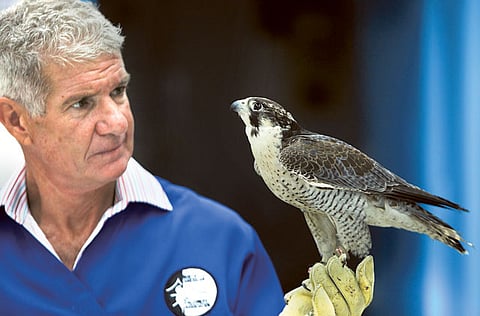Ways to keep falcon healthy
UAE has sophisticated medical facilities for falcons

Unlike earlier when falconers had to resort to traditional methods to look after their falcons, the UAE now has sufficient and sophisticated medical care facilities available for the bird that has been an integral part of desert life.
To ensure good health of your falcon, regular check ups are important and experts recommend and average of eight to 10 visits annually to a medical centre. Whether you are looking to buy a new bird or already have one, it is important that you know how to differentiate a healthy bird from a sick one.
The Dubai Falcon Hospital, which provides assistance to all falconers in the UAE, gets about 2,000 falcons annually for medical care, says Humaid Obaid Al Muhairi, managing director of the Dubai Falcon Hospital.
“People get their falcons for regular check ups and when the bird is sick. On an average a bird visits the hospital about eight to ten times a year,” he said.
“The first check up is usually at the beginning of the hunting season, or when the new bird is taken, at the end of hunting season, around October also a check up is required,” he says.
While a new falcon would cost anything from Dh1,000 and could go more than Dh30,000, for a falconer, it is more about pursuing his passion.
“A falcon is not a pet, it’s a companion and needs to be taken proper care of. You can tell if a bird is healthy if it has energy, watches her environment, preens, mutes and even plays. Such a bird is interested in eating, bathes regularly,” explains Al Muhairi.
Care
The falcon should be kept in a properly ventilated area and a proper source of water. Giving it proper housing that protects the bird from weather is among the most important elements to ensure good health of the bird.
“If sick, for example, it would have head down, would be disinterested in food, won’t look around, is kind of listless. If the bird’s eyes look bigger than normal, or there is puffiness around the eyes, it is an indication that you need to see a specialist falcon doctor. You also need to watch for any reduction in food intake and even if there is any bad smell. If you see that the bird is standing staring at the ceiling or with head backwards over the shoulders, this requires medical attention, it could be a sign of a vitamin deficiency and can be addressed through proper diet and vitamins.”.”
The food given to a falcon should be fresh or defrosted fresh frozen food. “The food, which usually contains feathers, fat, bones, blood, should be very fresh and not be expired. You also need to keep a tray of water close to the bird. Proper care is important,” asserts Al Muhairi . Also, feed the falcon once daily or, twice, if you want the bird to gain weight.
Cleanliness of surroundings needs to be maintained and usually falcons clean themselves. The falconer should also provide proper exercise to the bird.
Injuries and other problems
Among other common problems could be difficulty in breathing, a cough or a change of voice. This could be an indicator that Aspergillosis might be developing.
The situation is preventable, says Al Muhairi, if you maintain a well ventilated and clean facility for the bird. “For treatment, we use voriconazole, a medicine that was used first time by the hospital and is now recognized worldwide.”
Additionally, falcon handler should also keep a check in case there are flat cheesy plaques inside the bird’s mouth, any sharp cuts or even a bad breath.
Al Muhairi recommends that if there are serious scratches, bit wounds, the bird should be seen by a vet. “Your bid may get wounded during hunting, or, worse, may be attacked by a wild bird or bitten by prey. You need to be careful and check the wounds,” he says.
Apart from the precautions, falconers meet each other regularly to know more about the bird. “Sometimes, for instance, I would ask my father about the bird even before I visit a doctor. Experience counts,” Al Muhairi sums up.



